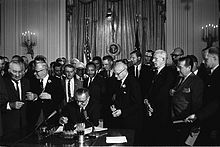New York State has had a moratorium on hydrolic fracturing (fracking) since 2008. Governor Andrew Cuomo has said that he won’t make a decision on lifting the temporary ban until the state’s Health Department finishes its study that was started in 2012. Some up state towns, concerned about the outcome of that study and the possibility that corporate friendly Gov. Cuomo would lift the ban, passed zoning ordinances banning fracking. This week New York State’s highest court upheld those ordinances:
The New York Court of Appeals upheld the ruling of a lower court that local governments have the authority to decide how land is used, which includes deciding whether or not fracking and drilling should be allowed on that land. The Court of Appeals heard arguments on two cases challenging local bans on fracking in June. The plaintiffs in those lawsuits argued that New York’s oil, gas and mining law takes precedence over local zoning laws, but in rulings both by a lower court and now the Court of Appeals, that claim was overturned.
Two New York towns – Middlefield and Dryden – that previously banned fracking were the focus of the lawsuits, but the ruling means that now other municipalities in New York can pass laws that ban fracking and drilling. So far, activists say, 170 towns and cities in New York have passed fracking bans or moratoria. [..]
The battle over the two towns’ fracking bans began in 2011, when an oil-and-gas company first challenged Dreyden’s ban on fracking. Not long after, landowner Cooperstown Holstein Corp challenged Middlefield’s ban.
The New York State Assembly had voted to extend the ban for another 3 years but the Republican controlled Senate adjourned without taking up the bill.
Municipalities around the country are taking up similar bans over concerns about contamination of vital water supplies and ground contamination by the chemicals used to release the oil and natural gases. This ruling could have an impact on those ordinances, as well:
Municipal bans are a growing phenomenon nationwide as localities target hydraulic fracturing, in which water and chemicals are pumped underground to break shale rock and release the oil and natural gas inside. Such cities and towns are often in conflict with state governments that want the revenue and the employment associated with the drilling technique that’s spurred an American oil and natural gas boom.
The battle is especially fierce in Colorado, where the governor and oil and gas companies have filed lawsuits seeking to overturn bans passed by local voters.
Pennsylvania tried to prevent its local governments from prohibiting fracking, but it lost in court. The Ohio Supreme Court is considering whether cities and towns have the right to ban the practice.
Attorneys from the environmental law firm Earthjustice helped the town of Dryden with the New York case, and they said Monday’s ruling “has sent a firm message to the oil and gas industry.”
New York State Petroleum Council Executive Director Karen Moreau said the ruling would pose a problem for natural gas development in her state.
In it’s 5 – 2 ruling, the court stated that its ruling was not about whether fracking was safe or not, but about the balance of power between state and local government.
This is a win for New Yorkers and the environment.



Recent Comments